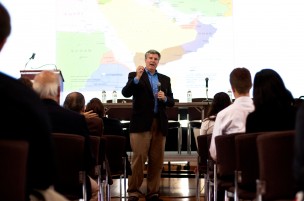
Andrew Ribner/Visual Editor
The student-organized second annual Wesleyan International Relations Association Conference (WIRAC) was held this weekend after a year of extensive planning. The conference was titled “The Cold War of the Middle East: Iran-Saudi Arabia Relations.” It featured a concert, an opening speaker, a panel discussion, and a keynote address.
The so-called Cold War that the conference referenced is a strategic competition for power between two Middle Eastern nations, Iran and Saudi Arabia, which use elections, access to resources, and conflicts in the region (among other factors) to attempt to gain influence over other important players in the Middle East.
Conference directors Anike Arni ’13 and Hira Jafri ’13 said that they saw this year’s symposium as a way to both expose the Wesleyan community to a topic with huge global implications and to get students involved with activities relating to international relations.
“This is an opportunity for all students interest[ed] in governance, economics, international affairs, diplomacy, religious conflict, cultural struggles, journalism, and much more to get a chance to interact with professionals in those areas as well as learn about a prominent issue in the news today,” Jafri and Arni wrote in an email to The Argus.
One of the directors of public relations and media for the conference, John DiCandeloro ’15, said he believes it is imperative that University students broaden their scope of awareness to encompass more global issues.
“Especially considering the Arab Spring and everything that has been going on in the Middle East, power relations are being reformed,” DiCandeloro said. “It is incredibly important to analyze the religiopolitical climate because a lot of current Middle East politics focus on the influence of Iran, what Iran is going to be able to do, and what Iran’s emerging role in the region is if it is going to be able to become the regional hegemon that it wants to be.”
WIRAC began with a concert featuring Zikrayat on Friday night. According to their website, the New York-based group is inspired by traditional Arabic music, blending the melodic and rhythmic traditions of cultures throughout the Middle East.
The following day was composed of an introductory lecture by University of Vermont political science professor Gregory Gause, a panel discussion featuring several notable Middle Eastern studies experts, and a keynote presentation given by Robin Wright in conversation with Walter Cutler.
As a part of his opening lecture, Gause offered his own exposition on the current Cold War of the Middle East.
“It’s not armies facing each other across borders; it’s regional actors,” Gause said.
The panel that followed, which was moderated by former Ambassador to the Kingdom of Saudi Arabia Walter Cutler, focused on more specific aspects of Iran-Saudi Arabia relations. Each member of the group provided a brief lecture, followed by a question-and-answer session with attendees.
Marvin Zonis, a member of the Board of Directors of CNA Financial, centered his short discourse on the economic effects of the new Cold War regarding oil prices, energy consumption, and foreign investment projects.
William Beeman, a professor and chair of the Anthropology Department at the University of Minnesota, discussed nuclear warfare issues and ethnic tensions between Saudi Arabia and Iran.
Trita Parsi, the founder and president of the National Iranian American Council, examined Iran-Saudi-U.S. relations within the sphere of politics.
The last lecturer, author-journalist Thomas Lippman, addressed common misconceptions surrounding the menace of a potential nuclear arms race within the Middle East.
This year, the keynote speech was structured as a casual conversation between Robin Wright, a successful journalist, author, and foreign policy analyst, and Walter Cutler, the moderator from the previous panel. The two long-established colleagues discussed the Cold War in more general terms and offered their different perspectives regarding the tension between the two nations, providing a more personal conclusion to the second annual WIRAC.
This year’s conference attracted a diverse range of attendees, including University students, professors, and others from nearby areas, and it spurred a larger debate about the crisis in the Middle East.
Arni and Jafri expressed their hope that the convention would spur further conversation and increase awareness within the community.
“We see this conference as a means of involving Wesleyan itself in the discussions,” Jafri and Arni wrote. “We hope that these talks have an impact not only on Wesleyan students and attendees, but that it also forces policy-makers and diplomats that have been dealing with these issues to take into account the perspectives and questions that are raised during the conference.”